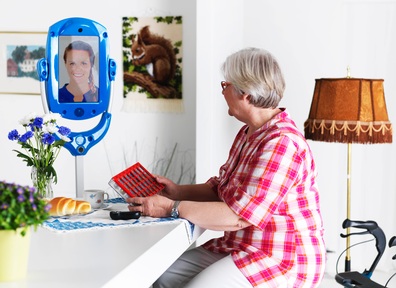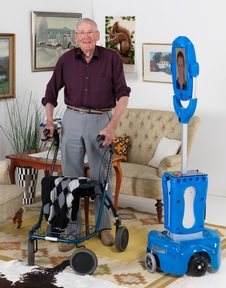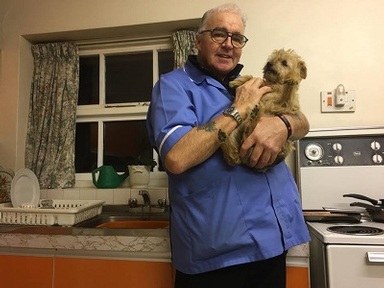Robots to be introduced into homes to help people with dementia live independently
Simple robots are being introduced into homes to help carers communicate with people with dementia and support their independent living.

The 1.5m high motorised robot includes an inbuilt camera which allows a two-way communication to take place and can be controlled remotely by a carer or family member.
The robot allows people living with dementia to remain in contact with friends and family as well as allowing carers to ensure the health of the person living on their own in potentially very rural communities.
Explaining the practical benefits of the robot, Emelin Collier, head of planning for NHS Western Isles said: “The Giraff is simple to use; it is kept in the home of the person with dementia, and the controls for the robot are with the person’s relative or carer.
“The relative could call into the robot to effectively wake it up, and the person with dementia would not have to do anything at all.
“The caller’s face would appear on the screen, and the caller could then navigate the robot through the home of the person with dementia to check that all is well, check medication has been taken, food has been eaten, the person has washed and dressed or just to provide reassurance or have a chat.”

NHS Western Isles is currently finding suitable people to pilot the robots in order to assess how successful it will be in supporting people to live on their own.
The technology will also be tested to discover whether it could be used to delay or prevent their necessary placement into a care or nursing home.
NHS Western Isles chief executive Gordon Jamieson explained: “This is an interesting idea and we are very much testing new ground here. It is well recognised that care of the elderly in general and the care of people with dementia in particular is one of the major challenges facing most countries in Europe today. By 2035, the Western Isles is projected to have the highest percentage of pensioners in Scotland, at 35 per cent of the total population.
“With an older population come both benefits to society and challenges in terms of healthcare, including an expectation that there will be a corresponding rise in the number of people with dementia. For some with dementia, it can at times be a lonely life, particularly if their relatives are unable to visit them regularly.”
The robot, which will mainly aid people with dementia, has been trialled in Australia with positive initial results and will now be piloted by NHS Western Isles.”
Mr Jamieson added: “We are absolutely delighted to have the Giraff here with us to trial and we have high hopes for how it may improve the quality of life for some dementia patients. As a new technology for us, the robot could also potentially be used in many other areas of healthcare to improve quality of care, live access to specialists, and speed up consultations, regardless of location.”
Named ‘Giraff’, the robot can be moved and controlled from an external computer working in a similar way to Skype, with an inbuilt camera facilitating video calls.
Mr Jamieson concluded: “Having seen the Giraff in action, I am extremely impressed with how easily it can be moved around by the ‘controller’ so that you can clearly see the environment of the patient, and can have a conversation and meaningful interaction, regardless of distance.”
Latest Innovative Care News
 13-May-19
'Pink drink' brain cancer treatment rolled out across NHS in memory of Baroness Jowell
13-May-19
'Pink drink' brain cancer treatment rolled out across NHS in memory of Baroness Jowell
 25-Apr-19
Louis Tomlinson helps 83-year-old who lost wife to dementia complete bucket list
25-Apr-19
Louis Tomlinson helps 83-year-old who lost wife to dementia complete bucket list
 05-Mar-19
Care worker of the year inspires nine-year-old son to work in care
05-Mar-19
Care worker of the year inspires nine-year-old son to work in care
 12-Feb-19
Michael McIntyre's jokes tested to see if they stop elderly catching flu
12-Feb-19
Michael McIntyre's jokes tested to see if they stop elderly catching flu
 25-Jan-19
Ninety-year-old and his dog can stay together, thanks to care worker
25-Jan-19
Ninety-year-old and his dog can stay together, thanks to care worker